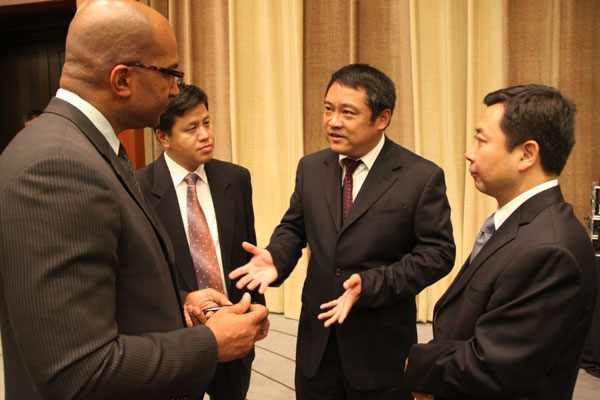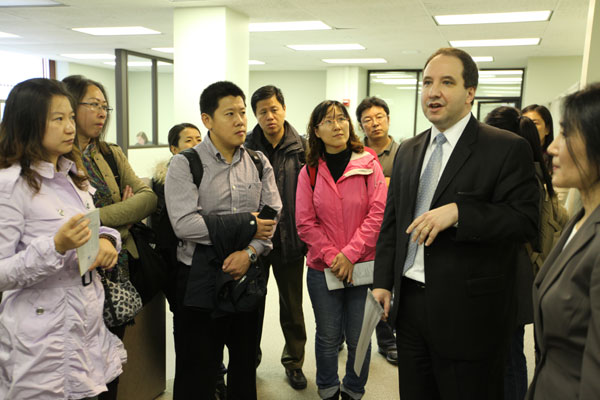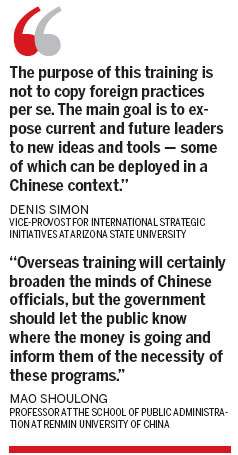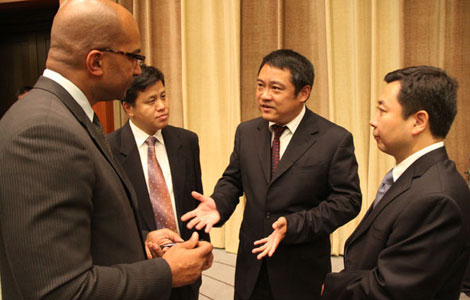'Glocalizing' top civil servants
Updated: 2012-11-13 07:34
By Wei Wei (China Daily)
|
||||||||
Overseas courses can make a world of difference in governance, reports Wei Wei in New York.
Having resumed work as a government official in the northeastern trading hub of Dalian four weeks ago, Pang Jun has been mulling over some changes inspired by his one-year Master of Public Administration course in Chicago.
 |
|
Zhou Bin (center), head of the Shanghai Chamber of Commerce in Chicago, and Pang Jun (right) in discussion with a senior partner from Chicago Magazine during the 2011 training program. |
During their time at the Illinois Institute of Technology, 40-year-old Pang and more than 20 other officials from Dalian studied courses on public policy, finance and communication, all taught in English, alongside students from around the world. They also had a chance to observe US life outside the classroom.
On a visit to Chicago's city council and the Illinois city of Naperville, Pang, who oversees Dalian's administrative permit service, was impressed by the speed at which things were done. In China, corporate or project registration can take months or even years, because applicants have to contact different government agencies at each step and wait 15 to 20 days to move on to the next, he said.
"But under the parallel system in US cities, people just hand in their application at one office, and then all the related agencies share and process the information simultaneously. The process is much quicker," said Pang, who plans to implement a similar system in Dalian in the coming year.
 |
|
Officials from Dalian in Liaoning province visit the Tax Division of Chicago's Department of Revenue as part of their one-year MPA program at the Illinois Institute of Technology. |
The 27 officials - most hold master's degrees, but there were also seven with PhDs or PhD candidates - were chosen by a competitive selection procedure.
|
 |
But in their first month in the US, the students struggled to understand "the fast lectures and cope with the piles of reading material", before finally engaging actively in class discussions. However, those initial problems didn't hamper the Chinese candidates, and they all graduated in September.
From open to global
Since Deng Xiaoping, the architect of China's reform and opening-up policy, called for "introducing wisdom from abroad" in the late 1970s, central and local authorities have been sending promising officials to Western countries and Singapore to study public administration, law and international relations.
About 257,000 people received training overseas from 2006 to 2010, said Ji Yunshi of the State Administration of Foreign Experts Affairs at a conference in 2011. During the same period, 41,000 took the Business Foreign Language Test organized by the administration, which has also certified 64 high-level overseas training institutions and 290 overseas training institutions.
Figures from the administration show that approximately 70,000 Chinese officials received on-the-job training overseas in 2010. Most enrolled in short-term programs, but some, like Pang, participated in a one-year degree course.
In addition to providing training for senior civil servants and young and middle-aged leaders, the administration also sent university administrators, senior executives and technicians of State-owned enterprises abroad to receive training.
Trainees are usually selected by the Party's organization department. To qualify for the same course as Pang, applicants must be younger than 50 and have at least three years work experience, a bachelor's degree and a score of at least 120 out of 200 in the English test overseen by the administration.











